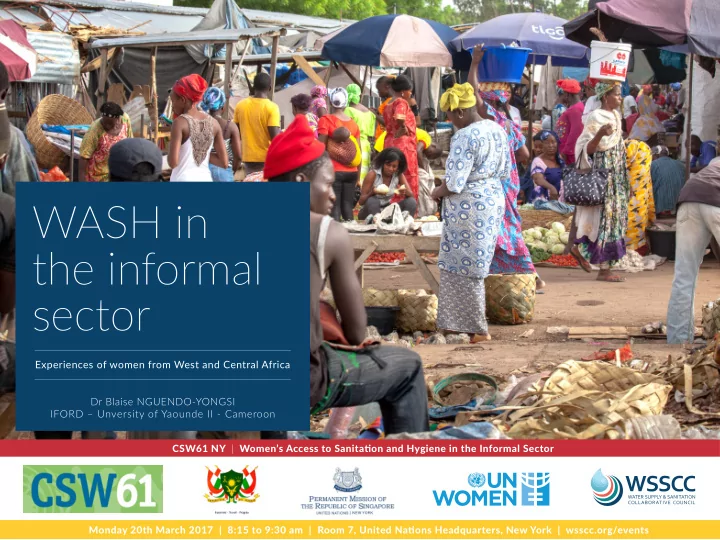

WASH in the informal sector Experiences of women from West and Central Africa Dr Blaise NGUENDO-YONGSI IFORD – Unversity of Yaounde II - Cameroon CSW61 NY | Women’s Access to Sanitatjon and Hygiene in the Informal Sector Monday 20th March 2017 | 8:15 to 9:30 am | Room 7, United Natjons Headquarters, New York | wsscc.org/events
I - POOR ACCESS TO WASH FACILITIES IN THE PUBLIC SPACE Results presented here derive Investjgated women are more involved in the informal economy from a joint WSSCC/UN Women SECTOR CAMEROON NIGER SENEGAL research under the framework of Food and drinks 32 18 20 the Joint Programme on Gender, Food processing 11 12 18 Hygiene and Sanitatjon implemented in 3 countries of Retail 21 48 39 West and Central Africa Office work 36 22 23 In those countries; access to WASH facilitjes is a challenge Numbers of public toilets in Yaoundé and Maradi PUBLIC PLACES YAOUNDE/CAMEROON MARADI/NIGER Markets 9 3 Bus statjon 7 6 Hospitals 13 4 CAMEROUN NIGER Schools/colleges/universitjes 45 11 SENEGAL Administratjve offices 27 15
· Latrines as most common used facilitjes II - STATE OF THE · Insufficient number of facilitjes FACILITIES · Poor quality of materials (1/3) · Women resort mostly to non improved toilets 1, In Cameroon: ~ 25% of women have direct 51 access to toilets; with up to 28 per toilet 13 14 22 MBILE LOLO BORGOP SITE MINAWAO 100 2, In Niger: 21% use toilets (whether improved or not) which means an open defecatjon rate of up to 79 % 36 33 25 · 3 families (18 individuals) per toilet MARADI ZINDER TILLABERI TAHOUA 3, In Senegal: about 62% resort to underground 49 water; i,e wells 25 20 6 SEDHIOU MATAM KOLDA KEDOUGOU
· Poorly managed facilitjes II – STATE OF THE · Irregularly cleaned (twice per week) FACILITIES · Maintenance here relies only on litule repairs (2/3) CAMEROON Level of funcionality of the toilets SECTOR CAMEROON NIGER SENEGAL 30% REPAIRS TO WALLS Availability of soap - - - 32% 20% 31,4% REPAIRS TO SLABS Presence of bins - - - 23% 08% 22,55% REPAIRS TO TARPAULINS Toilet cleaning 16% 48% 08% 3,6% REPAIRS TO ROOFS CHANGING SANITARY FITTING 4,9% /FAULTY PLUMBING OTHERS 8,2% 0% 20% 40% NIGER 100% 100% 75% 78% 50% TAHOUA 25% 25% 25% 25% MARADI 25% TILLABERI 11% 11% ZINDER 0% 0% 0% 0% 0% 0% 0% 0% 0% 0% 0% 0% REPAIRS TO WALLS REPAIRS TO SLABS REPAIRS TO TARPAULINS REPAIRS TO ROOFS CHANGING SANITARY FITTING
· More toilets needed as well as II – STATE OF THE LIMITED SPACE betuer maintenance FACILITIES NO LOCKS ON DOORS · Menstrual waste management: NO LIGHTING (3/3) an overlooked issue CAMEROON NIGER SENEGAL No separatjon between men and women Built with precarious materials Risk of rape Unhealthyness No light 0% 23% 45% 68% 90%
According to studies carried out in III - IMPACT ON Cameroon/Niger/Senegal among women, WOMEN’S ECONOMIC results show that during their menstruatjons ACTIVITIES and due to lack of/unsafe toilets: A majority of women fails The number of days they to go about their fail to run their businesses day-to-day actjvitjes is somehow higher: up to during menstruatjon 3 days Branch actjvitjes INDIVIDUALS 56% 51% 52% 51% 51% 45% 40% 35% 33% 33% 31% 31% 24% 20% 16% 11% 11% 0% CAMEROON NIGER SENEGAL CAMEROON NIGER SENEGAL ECONOMIC ACTIVITIES ADMINISTRATIVE ACTIVITIES DOMESTIC ACTIVITIES SCHOOL ATTENDANCE CAMEROON NIGER SENEGAL
III - GOOD PRACTICES IN NIGER (1/2) Use of disposable sanitary Hand washing afuer Wearing of underwears Disposal of sanitary napkin changing during menstruatjon napkins 94% 90% 79% 79% 75% 75% 74% 72% INDIVIDUALS 64% 58% 55% 54% CAMEROON NIGER SENEGAL CAMEROON NIGER SENEGAL CAMEROON NIGER SENEGAL CAMEROON NIGER SENEGAL CAMEROON NIGER SENEGAL
IV - GOOD PRACTICES IN NIGER (2/2) At the community level: Separate toilets in bus statjons, Zinder Improved toilets in markets, Tillabéri Healthy toilets in schools, Maradi At the normatjve level: · High level commitments for a betuer inclusion of women and girls’ sanitatjon rights into the country development strategies · 2 MHM related indicators introduced in Niger sanitatjon policy document PROSEHA
RECOMMENDATIONS (i) Increase the amount of WASH infrastructure in communitjes and households, and strengthen measures for the cleaning and maintenance of existjng infrastructure. (ii) Develop the constructjon of gender separated latrines in educatjonal establishments and public places, especially those frequented by economically actjve women, most of whom work in the informal sector. Raise awareness of the negatjve consequences of poor waste management on health and the environment. Develop waste management systems at the local level and facilitate access to water, sanitatjon and waste disposal for women and girls, specially in rural areas. Involve women in the design of sanitatjon and waste management structures to ensure menstrual waste.related needs for disposal, collectjon and treatment are taken into account.
II – STATE OF THE FACILITIES (1/3) Thank you for your kind atuentjon
Recommend
More recommend